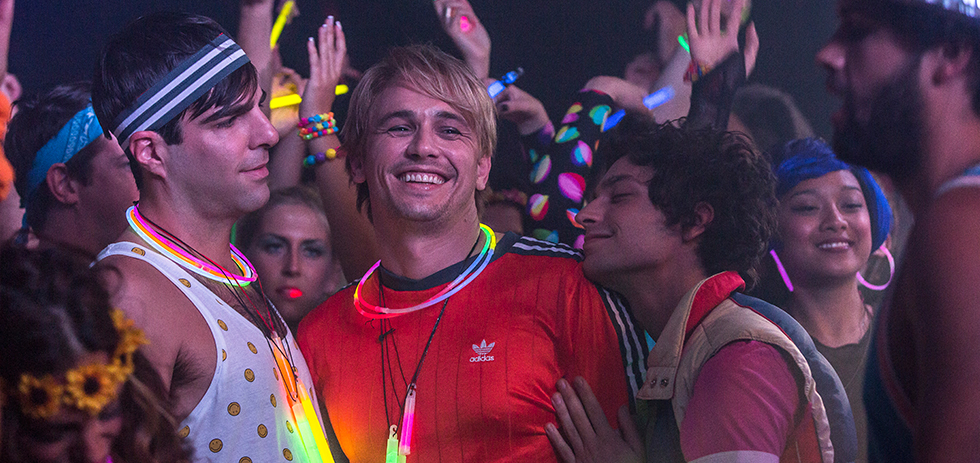Keeping in line with this year’s Frameline39 theme, Justin Kelly’s I Am Michael is provocative, a kind of reverse coming-out story that seems burdened under the weight of its own controversial status. Its subject, Michael Glatze (James Franco), is a stranger-than-fiction character, who underwent the transformation from gay activist and icon to heterosexual pastor. Despite an engrossing visual style, the film seems unable to comment effectively, on a greater level, on personal difficulty with sexual identity. Where this fails, Kelly does tease out some poignant moments of self-reflection on Michael’s part, but the exploration of his character’s motivations is also never quite developed sufficiently.
A cold open plucks us up and plants us in the future, far from Michael’s original life. Leaning forward, he advises a young Christian man, struggling with same-sex desires, to stay strong in his faith. When we are then transported back to Michael’s origins, the contrast is stark. The fast-paced, politically passionate days of his youth depict Michael as a staunch activist for his community, as well as a successful editor of XY magazine. His relationship with long-term partner Bennett (Zachary Quinto) seems idyllic and unshakeable, only enhanced by the addition of a third young man, Tyler (Charlie Carver). When he embarks on a nation-wide documentary filmmaking trip, he intends to empower young people in the LGBTIQA+ community. However, he begins to be plagued by self-doubt and introspection. Exacerbated by health scares and panics attacks, in addition to reflection on the premature deaths of his parents, Michael’s anxiety compels him to scrutinise his own beliefs. He delves into the teachings of the Bible, alienating himself from those closest to him. The film closes on an anxious Franco-as-Michael, about to lead his first sermon as a heterosexual pastor with a Christian wife.
Caught halfway between the depiction of an individual’s journey and raising, if not answering, greater questions around identity, I Am Michael achieves neither particularly well. Kelly bears the notorious burden of rendering Michael Glatze’s inner transformation on screen in a tangible manner. In doing so, he endeavours to provide a number of reasons for Michael’s change of heart. As is mentioned in the 2011 New York Times article and source of filmic inspiration, these reasons are those that affected Michael in reality: his parents’ untimely death, health problems, the need for spiritual guidance. However, their translation to screen, seems lost. None are given the amount of screen real estate necessary for a proper glimpse into Michael’s mind. Rather, they serve their purpose through superficial, dreamy flashbacks (Michael visits his mother’s scattered ashes), or through frantic montages (the spate of anxiety attacks that worsen over time). Moments of revelation in the film draw on popular culture’s tropes of what a personal breakthrough must look like. As a result, one scene has Michael jogging, only to gaze up in Malick-esque wonder at a tree, sunlight streaming through its leaves. Part of the problem with the contention of these various factors with each other, is Kelly’s choice of scope. Rather than attempt to represent his protagonist at a crucial moment of transformation, with sufficient time to reflect thoughtfully on the cause(s), he follows through from start to finish. I Am Michael is then a film that, consequently, necessitates much work to turn internal thoughts into meaningful visuals or grabs of dialogue.
Franco’s performance has the potential to counteract and amend the script’s difficulty in capturing Glatze’s inner struggle. Despite this, he never seems able to move beyond one-note frowns and looks of pained confusion which, more often than not, ring a little hollow. Undeniably, it’s a challenging role to undertake, but he’s at his best when he has screenmates Quinto and/or Carver with whom to evoke moments of emotional vulnerability or conflict. In a later scene washed over with a kind of wintry sunlight sensuously captured by cinematographer Christoper Blauvelt, Michael reunites briefly with Tyler at a non-descript café. The scene laments Michael’s former security in himself, his drive and passion for a cause and community from which no one could have foreseen his departure. It also laments his former intimacy with others, in particular men. In similar, too-short scenes, we’re given flashes of Bennett’s future life, with a new partner. Here, with the aid of Quinto and Carver’s affecting performances, Kelly touches on what seems to be the most engaging part of Michael Glatze’s story: the emotional consequences that arise.
In a post-screening Q&A session at Frameline39, Kelly noted that he was struck by Glatze’s desire to help, to lead and to guide others. This theme threads its way through the film, and Kelly manages some fascination in his protagonist’s story by including it. He echoes an early scene of Michael, vehemently discussing a hate crime against a young gay man with his peers at XY, with a later scene in which he criticises the ostensibly overly conservative teachings of a class at Bible school. In both moments, he is poised as the source of knowledge, of being in a position of authority and guidance. When established, this parallel points again to the film’s points of interest: the consequences of Michael’s journey, as it affected those around him. Once a role model to the LGBTIQA+ community through his activist and media work, he attempts to adopt a similar role as a pastor instead. Without passing judgment on the ethics of his altered mindset, Kelly prompts us to consider the impact behind it.
In the end, I Am Michael emerges a film less moving in its depiction of Michael Glatze’s uncommon story on an individual level. Instead, there’s immersive viewing to be found in the great, but all-too-brief moments in which we glimpse the repercussions of his new life.

